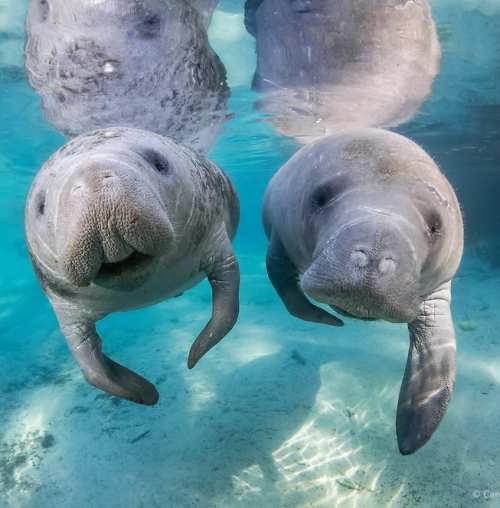JACKSONVILLE, Fla. (March 19, 2021) — Three giant otter pups made their much-anticipated public debut at Jacksonville Zoo and Gardens. The two females and one male, born on Oct. 16, are the second litter of this endangered species to be born at the Zoo in its history.
The first few months after birth are a critical time for vulnerable otter pups, so staff have been monitoring the family behind the scenes. The parents are 9-year-old Sarave, who came to the Zoo in 2018 from Zoo Miami, and 13-year-old Buddy, who arrived in 2011 as a rehabilitated animal from Guyana.
Buddy is blind and the most genetically-valuable animal of the Giant Otter Species Survival Plan (SSP) in the Association of Zoos and Aquariums (AZA). He was born on the banks of the Rupununi River in southwestern Guyana, one of the most biodiverse regions in the world. Orphaned as a pup, Buddy got a second chance at life at the Karanambu Lodge and Trust where he was raised by his surrogate mother, the late Diane McTurk. McTurk and her highly-trained staff rescued, rehabilitated, and reintroduced more than 50 giant otters during her lifetime.
Buddy was blinded in an accident at a young age and came to rely on McTurk and her staff for his care. Though Buddy learned to be a successful hunter through trips to the Rupununi River, the fact that he was blind made it impossible for him to return to the wild. McTurk decided to send Buddy to Jacksonville Zoo and Gardens where he joined the SSP to be matched up with a potential mate.
“Buddy’s second litter with Sarave is a huge success for the captive population. We were elated to celebrate the first pups and now we are even more excited to welcome their siblings. This is not only Buddy’s and Sarave’s success story, but a win for conservation of this endangered species as we strive to maintain a healthy, and diverse population,” said Dan Maloney, Deputy Zoo Director for Animal Care, Conservation and Wellness.
Giant otters are endangered and the rarest mammal on the South American continent, facing threats from hunting and habitat loss. The Jacksonville Zoo and Gardens has continued to support conservation and research in Guyana, including the vital work of UF Wildlife Biologist Dr. Matt Hallett and programs at the Karanambu Lodge and Trust. Funds provided by the Zoo have allowed Karanambu to hire and train staff to follow the protocols pioneered by McTurk.
The pups are now visible in the Emerald Forest Aviary within Range of the Jaguar with their one- year-old siblings, Aiden, Eleanor, Olivia, and Coker. Tickets at Jacksonville Zoo and Gardens must be purchased online, in advance at JacksonvilleZoo.org.
About Jacksonville Zoo and Gardens
For over 100 years, the Jacksonville Zoo and Gardens has aimed to inspire the discovery and appreciation of wildlife through innovative experiences in a caring environment. Starting in 1914 with an animal collection of one red deer fawn, the Zoo now has more than 2,000 rare and exotic animals and 1,000 species of plants, boasting the largest botanical garden in Northeast Florida. The Jacksonville Zoo and Gardens is a nonprofit organization and a portion of every ticket sold goes to the over 45 conservation initiatives Jacksonville Zoo and Gardens supports around the world, and here in NE Florida. JZG is proud to be an accredited member of the Association of Zoos and Aquariums. For more information, visit jacksonvillezoo.org.

